Book contents
- Frontmatter
- Dedication
- Contents
- List of figures and tables
- Preface
- 1 Introduction
- 2 Preliminaries
- 3 Arguments from antiquity
- 4 Medieval arguments
- 5 The golden age of natural theology
- 6 Unusual design arguments
- 7 Hume
- 8 Paley
- 9 Darwin
- 10 Loose ends
- 11 The modern likelihood argument
- 12 Intelligent design I: irreducible complexity
- 13 Intelligent design II: specified complexity
- 14 What is complexity?
- 15 Supernatural agents and the role of laws
- 16 A brief survey of physical law
- 17 Fine tuning I: positive arguments
- 18 Fine tuning II: objections
- 19 Conclusion
- Bibliography
- Index
6 - Unusual design arguments
Published online by Cambridge University Press: 05 June 2014
- Frontmatter
- Dedication
- Contents
- List of figures and tables
- Preface
- 1 Introduction
- 2 Preliminaries
- 3 Arguments from antiquity
- 4 Medieval arguments
- 5 The golden age of natural theology
- 6 Unusual design arguments
- 7 Hume
- 8 Paley
- 9 Darwin
- 10 Loose ends
- 11 The modern likelihood argument
- 12 Intelligent design I: irreducible complexity
- 13 Intelligent design II: specified complexity
- 14 What is complexity?
- 15 Supernatural agents and the role of laws
- 16 A brief survey of physical law
- 17 Fine tuning I: positive arguments
- 18 Fine tuning II: objections
- 19 Conclusion
- Bibliography
- Index
Summary
Overview
The arguments of the last chapter were recycled through seemingly endless variations during the two hundred years I’ve been calling the golden age of natural theology. As with Ray and Derham, the Stoic arguments from order and providence provided a sort of loose template that many a naturalist and theologian filled with examples from the natural world. However, the golden age did produce a few arguments of a decidedly different flavor. In this chapter, we explore attempts to demonstrate the existence of God from our experience of a ‘Visual Language’, of beauty in the world, or from our direct perception of design.
A bit about Berkeley and the Alciphron
The argument from the existence of a Visual Language comes to us from George Berkeley, Bishop of Cloyne, by way of his once famous and strangely titled book, Alciphron, or the Minute Philosopher. Berkeley was nothing if not original. Born in Ireland in 1685 – the same year as J. S. Bach and G. F. Handel – Berkeley was a cleric and a philosopher of the first rank. He was a generation behind Hobbes and Locke, a contemporary of Newton, Pope, and Hume. Berkeley’s philosophy was a sort of idealism which follows from taking the program of the British empiricists – particularly Locke – to its extreme.
Information
- Type
- Chapter
- Information
- An Introduction to Design Arguments , pp. 78 - 98Publisher: Cambridge University PressPrint publication year: 2014
